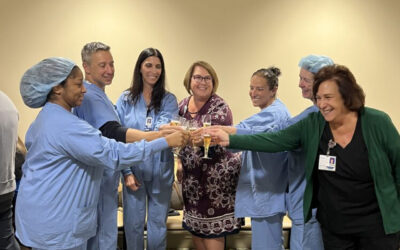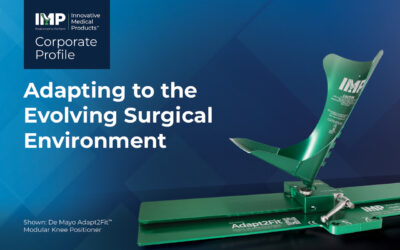ReadyPrep CHG® 2% Pre-Saturated Cloth for Preoperative Skin Preparation
SURGICAL SITE INFECTIONS: MULTIPLE PATHOGENS AND ANTIBIOTIC RESISTANCE
 Surgical site infections (SSIs) increase a patient’s risk of other morbidities and mortality, while increasing healthcare costs significantly.[1] Asymptomatic patients who are already colonized with pathogenic bacteria, such as Staphylococcus aureus, have a significantly higher risk of developing an SSI.[2] A variety of organisms can colonize a surgical incision and cause an infection, with strains that demonstrate resistance to antibiotics being particularly problematic. The most common microbial cause of SSIs in community hospitals is methicillin-resistant Staphylococcus aureus[3], and one study found that 60% of infected surgical wounds contained microorganisms that demonstrated antibiotic resistant patterns.[4]
Surgical site infections (SSIs) increase a patient’s risk of other morbidities and mortality, while increasing healthcare costs significantly.[1] Asymptomatic patients who are already colonized with pathogenic bacteria, such as Staphylococcus aureus, have a significantly higher risk of developing an SSI.[2] A variety of organisms can colonize a surgical incision and cause an infection, with strains that demonstrate resistance to antibiotics being particularly problematic. The most common microbial cause of SSIs in community hospitals is methicillin-resistant Staphylococcus aureus[3], and one study found that 60% of infected surgical wounds contained microorganisms that demonstrated antibiotic resistant patterns.[4]
One technique to reduce the likelihood of an SSI, as part of an overarching SSI prevention strategy, is to cleanse the incision site prior to surgery in order to reduce the microbial burden on the skin. Given the wide array of species that can cause an infection, coupled with the prevalence of antibiotic resistant pathogens causing SSIs, an antiseptic with broad spectrum activity capable of killing drug resistant organisms has the characteristics to be an especially effective preoperative skin preparation product. Medline Industries, Inc. now offers ReadyPrep CHG® Cloth, a pre-packaged, preoperative patient skin preparation solution that demonstrates these characteristics. Each package contains two preoperative skin preparation cloths, with each cloth pre-saturated with a 2% chlorhexidine gluconate (CHG) solution that is equivalent to 500 mg CHG.
BROAD SPECTRUM ANTIMICROBIAL ACTIVITY
The efficacy of ReadyPrep CHG® Cloth to kill multiple species of microorganisms was tested in a rigorous, in vitro, time-kill study.[5] The challenge microorganisms in this study included 192 isolates from 12 different organisms: Burkholderia cepacia, Candida albicans, Enterococcus faecalis, Enterococcus faecium, Escherichia coli, Klebsiella pneumoniae, Pseudomonas aeruginosa, Serratia marcescens, Staphylococcus aureus, Staphylococcus epidermidis, Streptococcus pneumoniae, and Streptococcus pyogenes. Additionally, there were multiple isolates from each organism that demonstrated resistance to antibiotics. Study results indicated the solution in ReadyPrep CHG® Cloth was efficacious in killing all isolates of all organisms, demonstrating effectiveness similar to a 2% CHG solution that served as a control in this study.
CLINICAL DATA
In two pivotal clinical trials[6,7], ReadyPrep CHG® Cloth met the primary endpoint for reduction of skin microorganisms in humans at ten minutes after product application. Moreover, the reductions in skin microorganisms were equal to, or significantly greater than, those caused by the active control condition, which was a commercially available liquid CHG product. Finally, skin microorganism counts remained suppressed relative to pre-treatment levels for six hours after product application.
ReadyPrep CHG® Cloth was well tolerated by subjects. In all clinical studies using ReadyPrep CHG® Cloth, there were zero instances of serious adverse events; the most common side effect was temporary, mild-to-moderate skin irritation at the application site, which is consistent with the known effects of 2% CHG on the skin.
Taken together, the human clinical data demonstrate ReadyPrep CHG® Cloth’s ability to reduce skin microorganisms, while the in vitro data suggest the product is efficacious against an array of microorganisms, including strains that demonstrate resistance to antibiotics.
NO EVIDENCE OF INDUCING RESISTANCE TO CHG
An additional in vitro study[9] was carried out to assess the potential for the ReadyPrep CHG® Cloth solution to induce microorganisms to become resistant to CHG. Forty-two isolates from eight different organisms were tested in the study. In a first phase, organisms were exposed to the ReadyPrep CHG® Cloth solution, which killed the vast majority of colony forming units (CFUs). In the second phase, the few surviving CFUs were extracted, bred, and then re-exposed to the ReadyPrep CHG® Cloth solution. In all 42 isolates from the eight different organisms, the same dosage of ReadyPrep CHG® Cloth solution applied in the first phase was needed in the second phase to kill the microorganisms. The absence of an increase in dosage needed to achieve the same effect indicates no evidence in this study of ReadyPrep CHG® Cloth inducing microorganisms to develop resistance to CHG.
ReadyPrep CHG® CLOTH: CONVENIENT AND EFFICACIOUS PREOPERATIVE SKIN PREPARATION
In two pivotal trials[6,7], Medline’s ReadyPrep CHG® Cloth met the primary endpoint for efficacy in reducing skin microorganisms at ten minutes post-treatment, and the number of microorganisms remained suppressed six hours after initial treatment. Data from in vitro studies demonstrates that the ReadyPrep CHG® Cloth solution is effective against a wide array of pathogens, including strains demonstrating antibiotic resistance. By significantly reducing skin microorganisms, ReadyPrep CHG® Cloth represents a critical tool in overall preoperative patient preparation in an effort to prevent surgical site infections.
For more information, visit www.medline.com/pages/chg/.
REFERENCES
- Leaper D, Ousey K. Evidence update on prevention of surgical site infection. Curr Opin Infect Dis. 2015;28(2):158-163.
- Skramm I, Moen AE. Surgical site infections in orthopaedic surgery demonstrate clones similar to those in orthopaedic Staphylococcus aueus nasal carriers. J Bone Joint Surg. 2014;96:882-888.
- Anderson DJ, Sexton DJ, Kanafani ZA, Auten G, Kaye KS. Severe surgical site infection in community hospitals: Epidemiology, key procedures, and the changing prevalence of Methicillin-Resistant Staphylococcus aureus. Infect Control Hosp Epidemiol. 2007; 28(9): 1047-1053.
- Magill SS, Edwards JR, Bamberg W, et al. Multistate point-prevalence survey of health care-associated infections. N Engl J Med. 2014; 370: 1198–208.
- Data on file. Medline Industries Study #R14-013.
- Data on file. Medline Industries Study #R13-053.
- Data on file. Medline Industries Study #R15-029.
- Data on file. Medline Industries Study #R17-004.
- Data on file. Medline Industries Study #R14-012.



![[Sponsored] Company Showcase: Medline](https://ortoday.com/wp-content/uploads/2019/05/MEDLINESHOWCASE.jpg)





